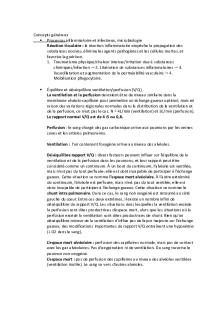Nutritional Supplements 2- App Physio PDF

| Title | Nutritional Supplements 2- App Physio |
|---|---|
| Course | Applied Exercise Physiology |
| Institution | University of the West of Scotland |
| Pages | 4 |
| File Size | 226 KB |
| File Type | |
| Total Downloads | 18 |
| Total Views | 128 |
Summary
Final summary for the nutritional supplements exam question. Grade achieved A3...
Description
Nutritional Supplements 2- Applied Physiology Definition “A food, food component, nutrient, or non-food compound that is purposefully ingested in addition to the habitually consumed diet with the aim of achieving a specific health and/or performance benefit.” (Maughan et al., 2018) Functional foods - e.g. mineral/vitamin fortified Formulated foods and sports foods – mainly for convenience e.g. CHO drinks etc. Single nutrients – e.g. calcium, iron, vit D Multi-ingredient products – e.g. combinations of the above designed for similar outcomes Why do athletes use supplements:
Considerations: Risk to benefit analysis • Is it effective? • Large market, but only a few have a good evidence base (caffeine, nitrate, creatine, buffering agents) • Is it safe? • Is it permitted for use? • Is there a chance it could be contaminated? • Is it appropriate for the stage of maturation? • Can the athlete afford it financially? • Does it work for the athlete in question?
Genetics, interactions with the microbiome, habitual diet can all affect individual responses Assessing the evidence: •
Critical thinking is key! Randomised, double blind, placebo-control crossover trails are the gold standard Often ecological validity is restricted by methodological considerations Further questions; Was it adequately powered? Were the participants elite? Would a small statistical effect translate to a real life performance improvement? Consensus statements – Expert opinion translate findings into recommendations. Should be re-evaluated regularly
Supplemental checklist: • What is the supplement and who may benefit? • Describe the proposed physiological mechanisms underlying the effects. • Describe the optimum dosage strategy – i.e. amount, timing etc. • Critically review the evidence of an ergogenic effect – examples with positive and no or negative effects. Is there consensus? • Health or side effects?
Sodium Bicarbonate: Sodium Bicarbonate is the monosodium salt of carbonic acid with alkalinizing and electrolyte replacement properties
Molecular formula - NaHCO3 Commonly known as baking soda. Many uses; cooking, cleaning, personal hygiene Which athletes benefit? • • • •
•
Used for over 80 years as an extracellular blood buffer, potential ergogenic effect in high-intensity exercise Events involving high rates of anaerobic glycolysis 1-7 min strenuous exercise (or intermittent/sustained) (Siegler et al., 2016) Intra-individual variability is high Duration of exercise important > benefits in ~60 s high-intensity efforts (performance enhancement of ~2%) < benefit in events of ~10 min or longer > benefits (>8% improvement) with greater number of sprints (Peeling et al., 2017) May be more effective in untrained individuals
Physiological Mechanisms • Blood Bicarbonate (HCO3-) is part of the acid base homeostatic bicarbonate buffer system • Sodium Bicarbonate (NaHCO3) enhances extracellular buffering of hydrogen ions (alkalising agent) • Increases coupled transport of lactate and H+ ions across muscle cell membrane into extracellular fluid • Therefore, reduces acidity excess acidity inhibits energy transfer and contractile proteins • Chronic manipulation of pH-level may supply a protective effect on mitochondria, leading to improved mitochondrial function and improved performance (Driller et al., 2013; Edge et al., 2006). Dosage: • 300 mg/kg 1-2 h before exercise can temporarily increase blood bicarbonate concentrations • Acute NaHCO3 doses of 0.2–0.4 g/kg BM reported to improve performance • Chronic; 5 days of 500mg/Kg BM split into four doses per day • Smaller doses over longer periods may reduce GI distress • Positive effects observed up to 2 days after cessation of supplement Side effects: • Severe alkalosis if taken in excess • Vomiting, gastrointestinal discomfort, bloating, and diarrhoea (more likely if not consumed with water) • Consumption with small carbohydrate-rich meal may alleviate GI distress ( ∼1.5 g/kg BM carbohydrates) (Carr, Slater, et al., 2011) • Sodium citrate is an alternative often reported to have less side effects (Requena et al., 2005)...
Similar Free PDFs

Nutritional Psychology
- 37 Pages

APP #1 - app
- 12 Pages

E Book-3 - ati supplements
- 122 Pages

Physio grossesse 2 pdf
- 14 Pages

Physio Midterm 2
- 19 Pages

All physio 2 notes
- 62 Pages

Usando MIT App Inventor 2
- 102 Pages

HBR Rsrch App 2 Starbucks
- 21 Pages

Guia Didactica APP 2 anatomia
- 10 Pages

MINI Nutritional Assessment TOOL
- 1 Pages

Fediaf Nutritional Guidelines 202014
- 96 Pages

Nutritional Types of Bacteria
- 2 Pages
Popular Institutions
- Tinajero National High School - Annex
- Politeknik Caltex Riau
- Yokohama City University
- SGT University
- University of Al-Qadisiyah
- Divine Word College of Vigan
- Techniek College Rotterdam
- Universidade de Santiago
- Universiti Teknologi MARA Cawangan Johor Kampus Pasir Gudang
- Poltekkes Kemenkes Yogyakarta
- Baguio City National High School
- Colegio san marcos
- preparatoria uno
- Centro de Bachillerato Tecnológico Industrial y de Servicios No. 107
- Dalian Maritime University
- Quang Trung Secondary School
- Colegio Tecnológico en Informática
- Corporación Regional de Educación Superior
- Grupo CEDVA
- Dar Al Uloom University
- Centro de Estudios Preuniversitarios de la Universidad Nacional de Ingeniería
- 上智大学
- Aakash International School, Nuna Majara
- San Felipe Neri Catholic School
- Kang Chiao International School - New Taipei City
- Misamis Occidental National High School
- Institución Educativa Escuela Normal Juan Ladrilleros
- Kolehiyo ng Pantukan
- Batanes State College
- Instituto Continental
- Sekolah Menengah Kejuruan Kesehatan Kaltara (Tarakan)
- Colegio de La Inmaculada Concepcion - Cebu



